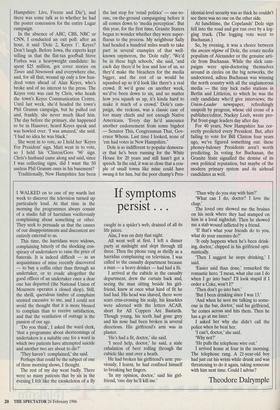If symptoms persist . . .
I WALKED on to one of my wards last week to discover the television turned up particularly loud. At that time in the morning the programmes always consist of a studio full of harridans vociferously complaining about something or other. They seek to persuade us that the causes of our disappointments and discontent are entirely external to us.
This time, the harridans were widows, complaining bitterly of the shocking con- spiracy of undertakers to raise the price of funerals. It is indeed difficult — as an acquaintance of mine recently discovered — to buy a coffin other than through an undertaker, or to evade altogether the good offices of an undertaker once a dear one has departed (the National Union of Mourners operates a closed shop). Still, the shrill, querulous timbre of complaint seemed excessive to me, and I could not avoid the thought that it is more blessed to complain than to receive satisfaction, and that the ventilation of outrage is the passion of our age.
`Do you think', I asked the ward clerk, `that a programme about shortcomings of undertakers is a suitable one for a ward in which two patients have attempted suicide and another two are about to die?'
`They haven't complained,' she said. Perhaps that could be the subject of one of these morning shows, I thought.
The rest of my day went badly. There were so many patients that by six in the evening I felt like the exoskeleton of a fly caught in a spider's web, drained of all its life juices.
Alas, I was on duty that night.
All went well at first. I left a dinner party at midnight and slept through till three. Then the phone rang as shrilly as a harridan complaining on television. I was called to the casualty department because a man — a heavy drinker — had had a fit.
I arrived at the cubicle in the casualty department, drew the curtain back and, seeing the man sitting beside his girl- friend, knew at once what kind of fit he had had. His head was shaved, there were scars criss-crossing his scalp, his knuckles were adorned with the letters ACAB, short for All Coppers Are Bastards. Though young, his teeth had gone grey and his nose had been broken in several directions. His girlfriend's arm was in plaster.
`He's had a fit, doctor,' she said.
`I need help, doctor,' he said, a stale exhalation of beer rolling through the cubicle like mist over a heath.
He had broken his girlfriend's arm: pre- viously, I learnt, he had confined himself to breaking her fingers.
`In my opinion, doctor,' said his girl- friend, 'one day he'll kill me.' `Then why do you stay with him?'
`What can I do, doctor? I love the chap.'
The loved one showed me the bruises on his neck where they had stamped on him in a local nightclub. Then he showed me a stab wound inflicted by a friend.
`If that's what your friends do to you, what do your enemies do?'
`It only happens when he's been drink- ing, doctor,' chipped in his girlfriend opti- mistically.
`Then I suggest he stops drinking,' I said.
`Easier said than done,' remarked the romantic hero. 'I mean, what else can I do when I go into bars? I'll look stupid if I order a Coke, won't I?'
`Then don't go into bars.'
`But I been drinking since I was 13.'
`And when he sees me talking to some- one in the bar, doctor,' said his girlfriend, `he comes across and hits them. Then he has a go at me later.'
I asked her why she didn't call the police when he beat her.
`I can't, doctor,' she said.
`Why not?'
`He pulls the telephone wire out.'
I arrived home at four in the morning. The telephone rang. A 21-year-old boy had just cut his wrists while drunk and was threatening to do it again, taking someone with him next time. Could I advise?
Theodore Dalrymple


























































 Previous page
Previous page